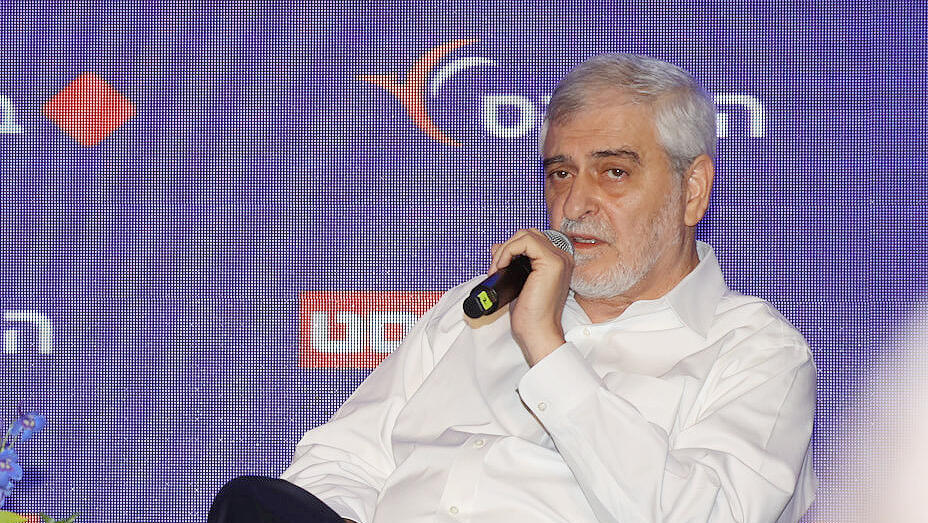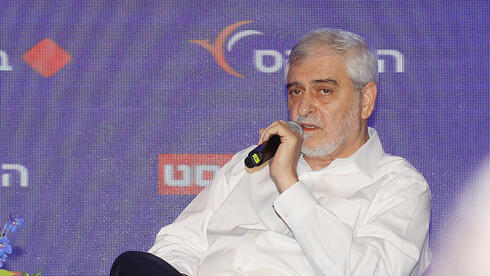
Forecasts Conference
Bank Hapoalim CEO Dov Kotler's perspective on economic changes post-October 7
Kotler emphasized the need for a revised economic strategy post-crisis when speaking at Calcalist's Forecasts Conference, held in cooperation with Bank Hapoalim and the Phoenix Group
"There are contractos today who present plans that are based on another price increase - I am doubtful," said Bank Hapoalim CEO Dov Kotler in a conversation with Calcalist Editor-in-Chief Galit Hemi as part of Calcalist's Forecasts Conference held in cooperation with Bank Hapoalim and the Phoenix Group. "We entered recent events with high real estate prices. I believe that the Israeli public will return to the market and there will be a rebound in the second half of 2024, but I do not believe in the predictions of another price increase. This is of course a general statement, but we are starting today at a higher price level. I believe in the Israeli economy, but I don't see a significant price increase at the moment," he added.
Take us back to that horrible Saturday of October 7th from the point of view of a CEO of a large bank. What is the first thing that you realize is going to change? What are the first business decisions that a bank needs to make at this point in time?
"On Saturday October 7, at 3:30 p.m., the bank's emergency banking forum convened, and we made a number of preliminary decisions so that we could open the branches and provide service the next morning to as many customers as possible. There is no doubt that we understood that we were heading for a long period of uncertainty. A few days later, the bank's management announced the establishment of a NIS 100 million ($28 million) recovery fund for the Gaza border settlements.
"Any event that affects the state, the people of Israel, also affects Bank Hapoalim. We have hundreds of reservists called up, and unfortunately we have 16 bank employees whose first-degree family members were murdered or killed. There are also wounded, two kidnapped families - Orli Gilboa whose soldier daughter was kidnapped on October 7, and Sharon Sharabi, whose two brothers were kidnapped in Kibbutz Be’eri. So I will start by saying that first and foremost we send wishes of a speedy recovery to all the wounded in the IDF, and equally important may the abducted be reunited with their family members as soon as possible."
Two and a half months have passed since October 7, and when we look at the conduct of the government and the treasury, the growth forecasts have obviously been updated downwards, the deficit has been updated upward, and we see very negligent management of the budget. The 2024 budget is going to start with a huge hole and we don't see as of now how the government plans to take care of it. What will 2024 look like, and how do you deal with such great uncertainty?
"Everything we see and read is an economic conception of October 6 (before the Hamas attacks). All national priorities need to change. I will give a small example: two years ago there was a big competition between the banks for financing land in Sde Dov. The government needs to make decisions and realize that we are in a new economic situation. What will serve growth and defense spending - should exist, and what will not - should be significantly reduced."
Related articles:
There is talk again about taxing excess bank profits.
"In the September financial reports, we reported that the bank's contribution to the war effort is over half a billion shekels: NIS 110 million in donations, and public relief worth NIS 420 million. Now when the outline is extended the number will increase by another 100-200 million. I don't know any economic entity that has raised NIS 500-600 million. Let's say that I represent 30% of banking, so the banking system has contributed around 1.5-2 billion - and I'm not including the provisions we made due to concerns about the economic impact, which are a similar amount.
"Who will ultimately be affected by overtaking the banks? I have a salary limit. Who owns the bank? 85% is held by institutions, by the people of Israel. When they say overtax, they are punishing the public, not me."
Do you estimate that we will see further failures of companies or contractors in the real estate sector? How bad is the situation for small businesses?
"50% of the real estate industry is not functioning, therefore there cannot be a situation where there will be no failures. Because we were more careful we will be hurt less, but we will also suffer. It can’t be that in a situation of leverage and high interest and an increase in construction costs, that there will be no failures. A Chinese worker who received 800 shekels yesterday will receive 1,200 today and I have also heard of contractors who pay 2,000. When construction costs increase significantly, of course, profits are squeezed, so there will be failures in the real estate industry.
"The banks have capital cushions to deal with this. I have a cumulative provision of almost NIS 8 billion, but contractors whose labor costs have risen significantly are certainly a risk factor.
"Regarding small businesses - at the moment we don't see a significant problem because as long as we postpone payments, the problems don't surface. When we get to April, May and June, we will certainly see small businesses with a high level of leverage that will take a hit.
"I want to end with an optimistic message. We have no other country, we will continue to live here, there will be a rebound, there will be growth, but we need to adopt an economic concept of October 7 and not from the day before that, to address the defense expenses and also the growth of the Israeli economy."
